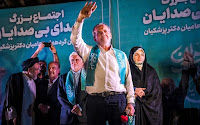The Leader connected Iran's current stance against negotiating
with the US to the Islamic Revolution, arguing that US hostility arises from
the loss of political and economic advantages that resulted from the
revolution.
He emphasized the necessity of drawing lessons from the
uprising of the 19th of Dey (January 9, 1978), identifying the
"relentless, substantial, and effective" efforts of media and social
media activists to "tear down the veil of the enemy's illusion of power
and to safeguard public opinion" as pressing needs of today.
Ayatollah Khamenei considered the 19 Dey uprising in Qom to
contain various lessons and insights, underscoring that the most important
lesson from that day is that it reveals what kind of Iran Washington desires
and prefers.
Highlighting President Carter's visit to Tehran on December
31, 1977, and his disingenuous commendation of Mohammad Reza Pahlavi as well as
Carter’s portrayal of Pahlavi Iran as an “island of stability,” Ayatollah
Khamenei explained, “The Iran that Carter deemed desirable for America in 1977
was, in terms of foreign policy, entirely subservient to the US and served to
secure American interests. Domestically, it witnessed the severe suppression of
all opposition movements, as well as any divergent viewpoints from the regime.”
The Leader of the Islamic Revolution remarked that, during
that period, the United States envisioned an ideal Iran characterized by
immense oil revenues accompanied by stark economic stratification. In terms of
science and technology, they desired a nation that remained underdeveloped,
while culturally, they sought a society where corruption, promiscuity, and
Western decadence would proliferate daily.
He emphasized that the uprising of the 19th of Dey freed
"the ideal Iran for the US" from America’s clutches. However, he
noted that “the US still yearns for that vision of Iran, but just as Carter
took this dream to the grave, so too will other Americans.”
According to Ayatollah Khamenei, the victory of the Islamic
Revolution created a crack in the concrete wall of Global Arrogance and shook
the West’s barrier. He added, “Another lesson of the 19th of Dey uprising is
that we must safeguard our public opinion against enemy propaganda.”
Referring to the publication of an insulting article against
Imam Khomeini in a newspaper in January 1978, the Leader highlighted the role
of propaganda utilized by the United States and the Pahlavi regime.
“They intended to silence the Zulfiqar of Imam Khomeini’s
tongue, which, from near the sacred shrine of the Commander of the Faithful
[Imam Ali], brought warmth and hope to people’s hearts. However, the people of
Qom, with vigilance and distrust of American and Pahlavi propaganda, thwarted that
move.”
Ayatollah Khamenei pointed to the exponential increase in
the use of propaganda tools by the United States to consolidate the outcomes of
its military actions, saying, “In Gaza, they massacred tens of thousands of
people, yet they could not eliminate Resistance with their [military] hardware.
In Lebanon, they martyred a figure like Sayyid Hassan Nasrallah and other
commanders, but Hezbollah was not eradicated and will not be eradicated.”
In another part of his speech, the Leader described Iran as
a “strategic pinnacle” in the world, endowed with valuable blessings such as
natural resources and above-average human resources.
He said, “For several decades, starting around 80 years ago,
Iran was essentially owned by America. But the Islamic Revolution freed the
country from America’s grip, and this is why they will not forget their
resentment over the Islamic Revolution.”
The Leader of the Islamic Revolution addressed questions
raised by some individuals about why the Islamic Republic, despite its relations
with European countries, refuses to negotiate or establish ties with the United
States. He responded, “Pre-revolution Iran was under American ownership, but
the Islamic Revolution liberated that enormous political and economic
opportunity from US control. Therefore, their grudge toward the Revolution is
[deeply rooted], and this differs significantly from European countries.”
Ayatollah Khamenei described one of the primary demands of
Global Arrogance, led by the United States, as ensuring their interests and
considerations are factored into the decisions of other nations, including
Iran.
Stressing the dangers of yielding to such demands, he said,
“Succumbing to America’s excessive demand undermines democracy and the nature
of democracy in the country.”
“The people have voted for officials to secure their own
interests, not those of America. Therefore, decision-makers must focus solely
on the interests of the Iranian nation and the Islamic Republic and disregard
the interests of America and the Zionists entirely, as they are fundamentally
hostile to our nation and the Islamic Republic, wishing for the destruction of
Iran.”
He further pointed to the United States’ failure to reclaim
control over Iran despite significant efforts and costs over the past 46 years,
calling this another reason for their grudge toward the Iranian nation and the
Islamic Republic.
He remarked, “America has been defeated in this country and
seeks to compensate for that defeat. As a result, they pursue enmity against
the Iranian people in every way they can.”


